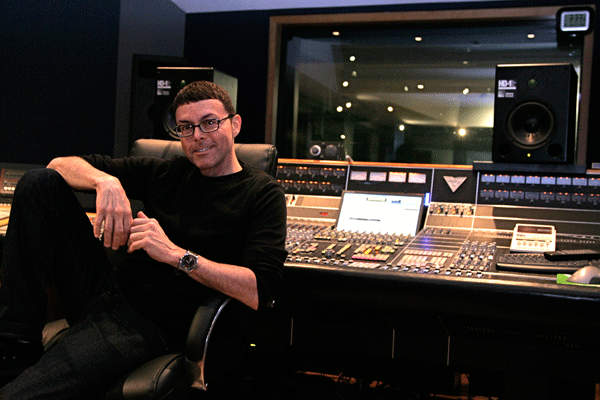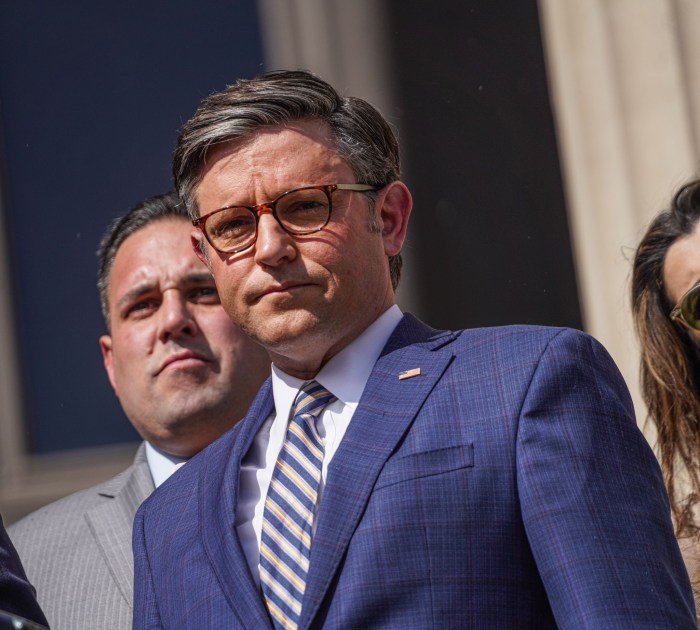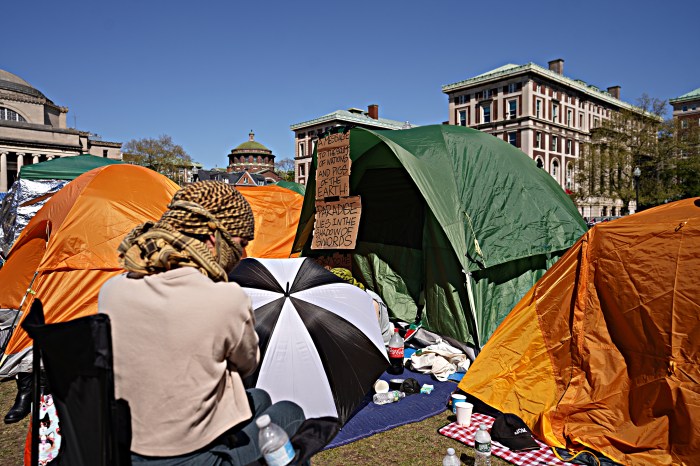
BY SAM SPOKONY | Richard Barone is a guy who likes to say “yes.”
As one of the unsung heroes of modern pop music, he brought avant-garde sensibilities to the genre as the frontman of The Bongos in the ’80s, and evolved into a solo artist who arguably helped pioneer the chamber pop sound that took off in the ’90s. Not to mention the other gains he’s made over the years — through collaborations with artists as diverse as Lou Reed, Tiny Tim and Moby — and his work as a producer, most recently for a new music video by folk legend Pete Seeger.
And as a longtime Greenwich Village resident, Barone has certainly been just as active: He’s maintained a presence as a community advocate, contributed valuable effort to a local nonprofit, and recently took on a professorship at New York University.
“There have been very few times when I haven’t been happy with the fact that I’ve said yes,” Barone said, with a reflective chuckle, as he sat in one of the offices he uses at N.Y.U.’s Clive Davis Insitute of Recorded Music on Mercer St.
He added that, even amidst all of his past successes, this has been a pretty good year.
A particularly bright point he was referring to is that on Oct. 30, the DigSin record label will release a limited-edition box set to mark the 25th anniversary of Barone’s first solo album, “cool blue halo.”
The set features a remastered version of the original album, as well as both a recording and video of a reunion concert he performed on May 4 at City Winery in Hudson Square. In addition, it includes an exclusive DVD documentary about the history of “cool blue halo,” plus a vinyl record with two singles and a 48-page tribute book.
When it was first released in 1987 — as a live recording at The Bottom Line, the former Village venue on W. Fourth St. — “cool blue halo” made waves with its innovative approach to pop-rock, as well as the diverse instrumentation and sidemen Barone employed to achieve its sound. But he explained that the newly remastered version will give fans an even more complete and accurate listening experience than the original ever could.
“Now it sounds the way it should’ve sounded back then,” Barone said. “The original CD just never had the full fidelity I wanted, and it’s so great that now people are going to hear how it actually sounded to me in the studio. It makes the album feel new again, and that’s all I could ever want.”
He added that being able to perform and release the landmark album once again has even allowed him to see it in a new light.
“I’ve always written my songs through a stream of consciousness, so I never dwelled on what I was singing about in those days,” Barone said. “But looking at it now, I see it as having more weight than I imagined, and greater meaning. That’s the truth.”
He also turned a nostalgic eye to his own presence in the neighborhood over the decades.
Barone, who is originally from Florida, has lived in the Village since 1984. His first residence in the area was a small studio apartment on Perry St., between Bleecker and W. Fourth Sts., where, as he wistfully recalled, most of the writing and rehearsing for “cool blue halo” took place. He joked that, after a decade, he outgrew that space because it couldn’t fit his guitars.
Since 1994, Barone has lived on the west end of Waverly Place, in an apartment that he now shares with a roommate. That location within the heart of the Village has led him to become increasingly involved in attending and contributing to Community Board 2 meetings, he explained, both because of his eternal “yes” mentality and an innate desire to keep the neighborhood safe.
“To me, Greenwich Village is like Vatican City,” Barone mused, “in that it’s a sacred place that must be maintained with that same kind of respect. And that’s why I get involved, it’s why I go to the meetings and raise my voice.”
Earlier this year, he even wrote a talking point in The Villager to advocate for an open park at the triangle at Greenwich and Seventh Aves. and W. 12th St. — a site slated for public use following the demise of St. Vincent’s Hospital. Barone said he’s optimistic about the current plans for the space, which now also include an AIDS memorial, but that he’ll certainly be ready to provide some input — positive or negative — once the new design is actually constructed.
Thinking back further, he also touched on some of the music venues in the West and East Village that have unfortunately closed down over the course of his many years here. He mourned the loss of The Bottom Line in 2004, but added that his favorite local venue in those days was King Tut’s Wawa Hut, which was located for years at E. Seventh St. and Avenue A until it closed in the mid ’90s.
Barone fondly remembered one particularly classic gig at King Tut’s in 1987, when he was playing with the band for his solo project just before “cool blue halo” was released. The opening act that night, he explained, was a duo comprised of a guy with a drum and another guy who was naked except for a layer of cake batter covering his body.
“The one guy just played a drumroll that started out slow and then became really fast,” Barone recalled, laughing, “and as he did that, his buddy started dancing and spinning, so the cake batter flew over the audience, and, unfortunately, all of our instruments, until he was totally naked onstage.”
Another Village connection he’s made in recent years is the result of his work at Anthology Film Archives, a nonprofit film archive and theater at Second Ave. and E. Second St. that restores, maintains and exhibits a vast library of independent and avant-garde cinema from around the world.
Barone — who has a passion for film and studied it in college — explained that the relationship began when legendary filmmaker and former Village Voice critic Jonas Mekas, who runs Anthology, contacted him several years ago after learning he’d previously collaborated with singer and ukulele player Tiny Tim, whom Mekas had documented earlier in his career. Barone then suggested organizing some benefit concerts to help fund Anthology, the first of which took place in 2009 and featured performances by Sonic Youth, Lou Reed, a punk band led by filmmaker Kenneth Anger and The Virgins.
“It was one of my favorite shows that I’ve ever produced,” Barone said.
More benefit concerts followed, and Barone was eventually named to Anthology’s board of advisers last August — a position he proudly embraces.
In addition, a special event will be held at Anthology Film Archives on the evening of Nov. 5, as part of the “cool blue halo” 25th anniversary celebration, he said. The event — which Barone acknowledged will be an especially exciting one for him — is going be held in three parts: First, Mekas will interview Barone about the album and his career, then the documentary featured in the 25th anniversary will be screened, and Barone will end the night with a brief performance, which he said will likely include a few special guests.
And the latest addition to the tunesmith’s lengthy résumé is his professorship at N.Y.U.’s Tisch School of the Arts, which began at the start of this year.
In 2008, the university asked Barone to give a couple of lectures based on his 2007 book “Frontman: Surviving the Rock Star Myth,” in order to give music students insight into his career and tips on how to navigate the world of performance. The lectures were so well received that Barone was asked to put together several one-day workshops on the subject over the next few years.
Last December, after the conclusion of yet another appearance by Barone, the university suddenly offered him a teaching position if he could turn the workshop into a full 14-week course, and Barone happily accepted. He now teaches a class called “Stage Presence,” in which he helps students of all backgrounds and levels of skill to discover their own musical persona and more effectively engage their audiences in live performance settings.
“But I never think of it as a job,” Barone said of his new professorship, adding that he hopes to continue the classes in the future, even as he also plans to release a new solo album in the near future and continue touring when he can.
So, all things considered, it certainly has been a pretty good year for an artist who remains one of the Village’s top musical talents. But rather than tout his own accolades too heavily, Barone instead expressed an unexpected sense of newfound balance that has come with his work at N.Y.U.
“It’s very symbolic for me,” he said, with a smile, “because I live all the way on the west end of Waverly Place, and when I teach, my class is all the way at the other end of the street, so it kind of bookends the Village for me.”
And although he’s still going to be performing and traveling across the world to continue his career, Barone mentioned that he can’t see himself ever leaving the neighborhood for too long.
“I just feel most at home here,” he said. “I used to tour constantly, and I would fall in love with cities like Berlin or London… . I’d fall in love with them for the moment. And I’d have, like, a fling with the city. But I always got homesick for the Village.”

















